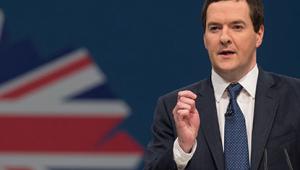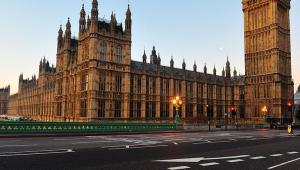By Richard Johnstone | 15 January 2015
Chancellor George Osborne has proposed a new fiscal rule that would require the Treasury to run a surplus unless the Office for Budget Responsibility has judged the economy to be facing abnormal pressures.

Image © iStock
Setting out the government’s future economic policy yesterday evening at the Royal Economic Society, Osborne said a permanent surplus in times of growth was one of the policies that could help Britain become the richest major economy in the world on a per capita basis.
He said the coalition had made progress in tackling an inherited budget deficit of 10.2% of gross domestic product and unemployment of 8%, with annual fiscal consolidation over the last four years of around 1.6% of economic output according to the IMF.
‘In response to the acute crisis in the eurozone, we made no significant changes to tax policy or spending plans – indeed annual government spending has continued to come in slightly below the plans we set out in 2010,’ he said.
However, he added that that the job of restoring the health of the public finances was not yet done.
‘Some huge economic challenges remain – the deficit has been cut by half, to 5% of gross domestic product. But that is still far too high, debt is set to fall in 2016/17 but at 81% of GDP it leaves us exposed.’
To tackle these problems, Osborne insisted there was a need to set to new rules to ensure that the UK had a plan to reduce its national debt.
On Tuesday, MPs voted to approved an update to the coalition government’sCharter for Budget Responsibility, which committed the Treasury to balancing the cyclically adjusted current budget over a three-year period at every Budget, and to have public sector debt falling as a percentage of gross domestic product by 2016/17.
However, Osborne said that ‘balancing the structural current budget cannot be the end point of Britain’s journey to restore fiscal credibility’.
Instead he said there was a need for an absolute surplus, which he had pledged to deliver bythe end of the next Parliament, to be delivered in times of growth.
‘The argument for a surplus has two parts: first, high levels of national debt are risky and damaging for an economy like the UK; and second, the only reliable way to reduce debt levels when inflation is low is to run an absolute surplus,’ he added.
‘My decision to target a surplus is not a judgement based on ideological or party political grounds; it is based on the evidence and a realistic assessment of what is prudent for the UK.
Under the plan, an independent body, most likely the Office for Budget Responsibility, should judge whether the economy is facing any pressures. If not, in good times the government should be obliged to keep an absolute surplus in public spending, while in bad times the government will have to set out a clear plan to get back to health.
Elsewhere in his speech, Osborne announced that the government would need to take a decision early in the next Parliament about how to sell off the government’s stake in bailed-out bank Royal Bank of Scotland.
Osborne said that the government had made progress in restoring the financial sector to health following the credit crunch of 2008, withNorthern Rock having been re-privatised and the government’s share in Lloyds, which was also bailed out by the last Labour government,now below 25%.
Although RBS, which is 79% owned by the taxpayer, had been restructured following the government bailout, the chancellor said it was not yet at the point where it cold be sold off.
‘Early in the next Parliament we will have to make a decision on the timing of any exit programme from RBS,’ he added.
‘It is not good for taxpayer value or for the competitiveness of our banking system to have such a large and complex bank in state hands for too long.’





















